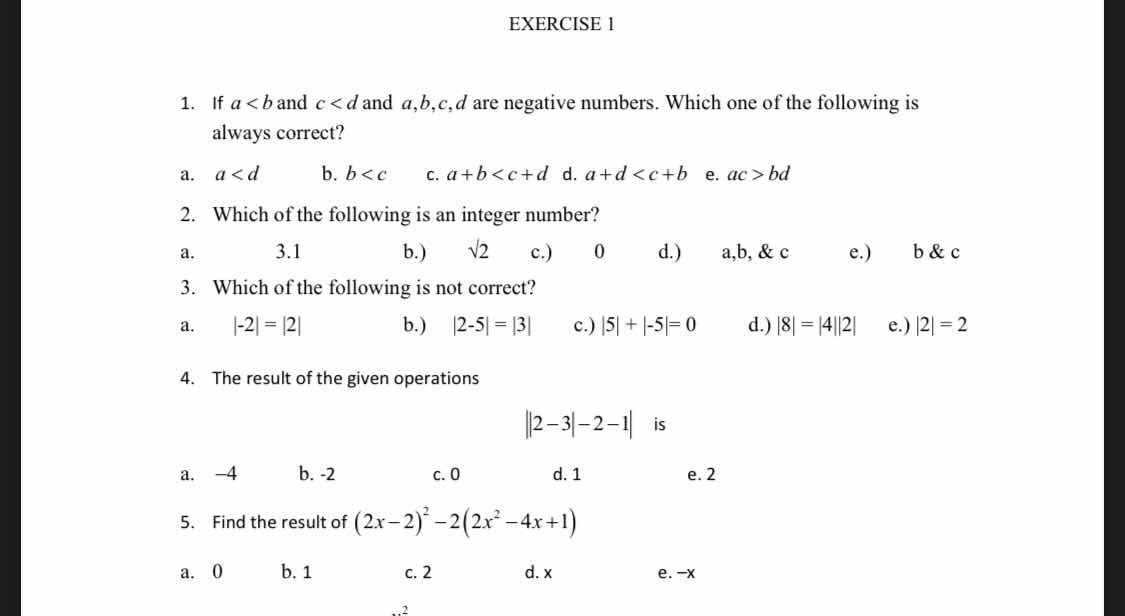1. If a < b and c < d and a, b, c, d are negative numbers. Which one of the following is always correct? a. a < d b. b < c c. a + b < c + d d. a + d < c + b e. ac > bd 2. Which of... 1. If a < b and c < d and a, b, c, d are negative numbers. Which one of the following is always correct? a. a < d b. b < c c. a + b < c + d d. a + d < c + b e. ac > bd 2. Which of the following is an integer number? a. 3.1 b. √2 c. 0 d. a, b, & c 3. Which of the following is not correct? a. |-2| = |2| b. |2 - 5| = |3| c. |5| + |-5| = 0 d. |8| = |4| |2| e. |2| = 2 4. The result of the given operations |2 - 3| - 2 - 1 is a. -4 b. -2 c. 0 d. 1 e. 2 5. Find the result of (2x - 2)^2 - 2(2x^2 - 4x + 1)

Understand the Problem
The question involves various mathematical exercises related to inequalities, integers, absolute values, and algebraic expressions. Each part requires evaluation of the provided statements or problems to find correct answers.
Answer
1. a or b 2. 0 3. c 4. None 5. 6
Answer for screen readers
- a or b
- c
- c
- Not provided
- 6
Steps to Solve
- Evaluate the Inequality Relations (Question 1)
Given that $a < b < c < d$ and all of these are negative numbers, we can analyze each option:
- Option a: $a < d$. This is true since $a < d$ is given.
- Option b: $b < c$. This is also true since $b < c$ is given.
- Option c: $a + b < c + d$. Since $a, b, c, d$ are both negative, $a + b$ will be a larger negative number than $c + d$, hence can be false.
- Option d: $a + d < c + b$. This could be true or false depending on the specific numbers, hence inconclusive.
- Option e: $ac > bd$. Since both products involve negative numbers, $ac$ could be greater than or less than $bd$ based on their values—they depend on the actual magnitudes.
Thus, the always true statement is a or b.
- Identify an Integer (Question 2)
Now check each of the options for being an integer:
- Option a: $3.1$ is not an integer.
- Option b: $\sqrt{2}$ is not an integer.
- Option c: $0$ is an integer.
- Option d: a, b, & c includes non-integer values.
The integer is c. $0$.
- Determine the Incorrect Statement (Question 3)
Evaluate the statements:
- Option a: $|-2| = |2|$. This is true since both expressions evaluate to $2$.
- Option b: $|2-5| = |3|$. This is false because $|2-5| = | -3| = 3$, but equals $3$, thus this works.
- Option c: $|5| + |-5| = 0$. This is false as $|5| + |-5| = 5 + 5 = 10$, not $0$.
- Option d: $|8| = |4| | 2|$. This is false as $|4| |2|$ is 8.
- Option e: $|2| = 2$. This is true.
The incorrect statement is c.
- Evaluate the Expression (Question 4)
Simplify $|2 - 3 - 2 - 1|$:
- Combine the numbers inside the absolute value: $$ 2 - 3 - 2 - 1 = -4 $$
- Take the absolute value: $$ |-4| = 4 $$
Thus, the answer is none of the provided options match.
- Find the Result: Expression (Question 5)
Calculate the expression:
$$(2x - 2)^2 - 2(2x^2 - 4x - 1)$$
Expanding the squared term and distributing:
-
Expand $(2x - 2)^2$: $$ (2x - 2)(2x - 2) = 4x^2 - 8x + 4 $$
-
Expand $-2(2x^2 - 4x - 1)$: $$ -2(2x^2 - 4x - 1) = -4x^2 + 8x + 2 $$
-
Combine the results: [ 4x^2 - 8x + 4 - 4x^2 + 8x + 2 = 6 ]
The final result for the expression is a. 6.
- a or b
- c
- c
- Not provided
- 6
More Information
- The inequalities depend on the ordering of negative numbers.
- The integer zero is significant in mathematics as the additive identity.
- Absolute value properties are crucial in determining true and false statements.
- This exercise involves algebraic manipulation and the properties of integers and absolutes.
Tips
- Not accounting for the properties of negative numbers in inequalities.
- Confusing non-integer results such as fractions and roots as integers.
- Miscalculating absolute values by overlooking their definition (always non-negative).
AI-generated content may contain errors. Please verify critical information